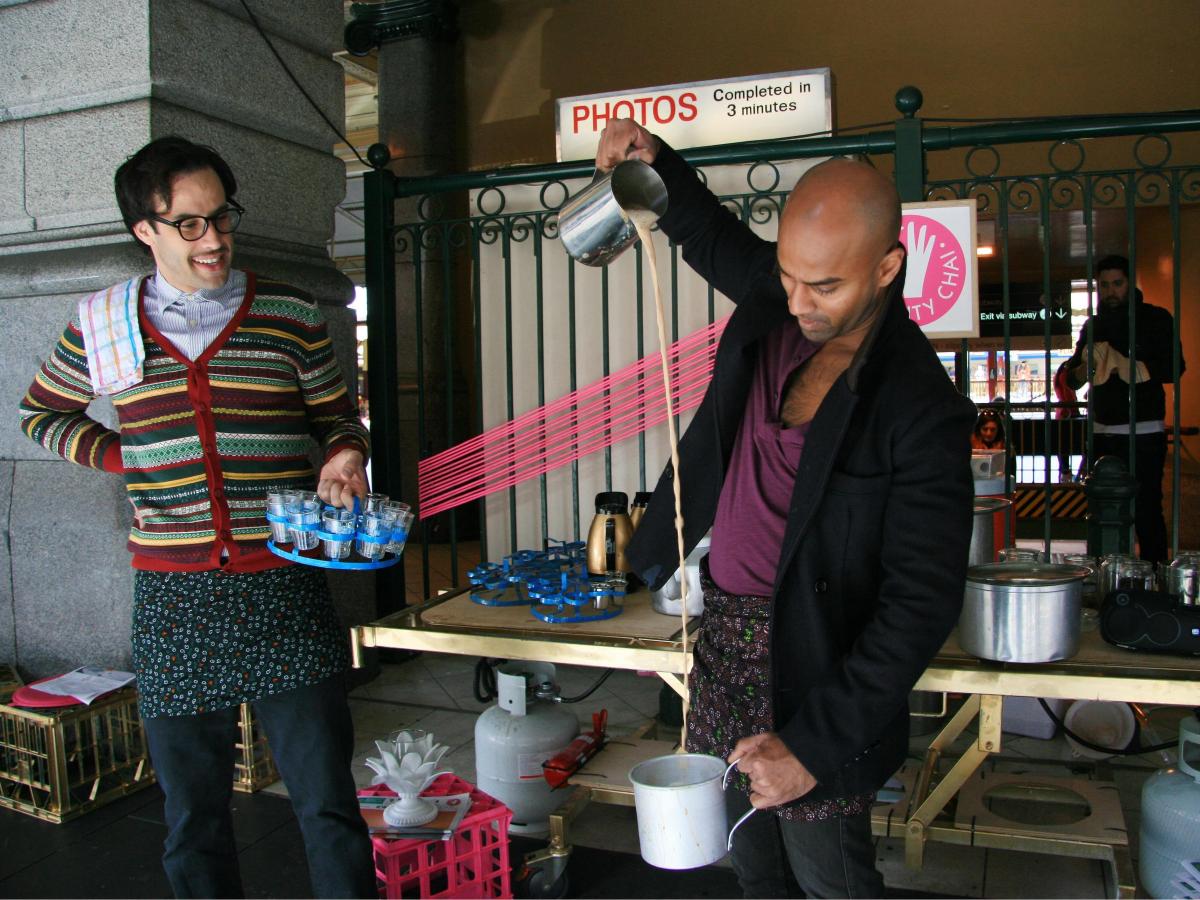Amid the bustle of Melbourne’s iconic Flinders Street Station you could hear the calls: ‘Would you like some chai?’
These are not usually the words you hear every day when strolling along Melbourne’s streets. In fact, it seemed quite bizarre.
Three chatty chai wallahs (specialist Indian tea makers) and waiters are currently proffering passersby cups of tantalizing, freshly brewed, spicy Indian tea – for free. In return, they receive a curious glance or the occasional enthused customer who is lured by the fragrance and steam hissing from the pots stationed within the open-air tea cart. A bright pink sign hovering above the tea cart signals that this is ‘Kwality Chai.’ Pun intended.
For the adventurous passerby prepared to stop and drink some ‘quality’ tea, this promises to be a stirring experience. A team of dynamic performers (Sharon Johal, Luke D’Emannuelle, Dushan Philips and Jan Di Pietro) playing chai wallahs and waiters, usher you to sit and relax with your cuppa on one of their cluster of comfortable stools. Of course, this isn’t a lone ‘drinking’ experience, but rather a very social one. The waiters and chai wallahs converse with you on topics ranging from politics to your plans for the day, sometimes speaking in an invented Australian-Indian language. Additionally, fellow customers may engage you in small talk. If you’re lucky, the performers might even offer you the specially published local newspaper to read, ‘Kwality Times.’ Old-school Hindi songs play on the ‘New World’ radio station, transporting you to times past. Above all, recorded sounds of India’s bustling streets – rickshaws, horns, motorists and traffic congestion, immerses you in roadside havoc. When you’ve finished your tea, a waiter bellows ‘Have a karmic day!’
Everything about the experience is authentically Indian, from the delicious tea to the assembled tea cart, and the chirpy performers who stay in character throughout. As with all live art performances, you can expect a disparate world to unfold in front of your eyes. The participant realises they are in an alternate reality far removed from their immediate surroundings, yet so intertwined within it.
Situated at Flinders Street Station near Platform 1, Kwality Chai is a great representation of our transitory experiences and fast-paced lives. It is an uncanny intervention into the every-day, drawing in an unsuspecting public as the audience to experience Australia’s cross-cultural identity through the making and serving of tea.
This live art performance comically replicates the chai wallahs in India who can be found serving tea boiled with spices, sugar and milk everywhere from busy urban street corners to hidden alleyways, at bus depots and railway platforms, walking through train carriages, along riversides and on footpaths that lead to religious pilgrimage sites. In India, chai is more than just a cup of tea to start the day. This thick, sweet drink is an integral part of the rhythm of life and social experiences. Moreover, chai carts are often family businesses spanning many generations.
Historically, tea was introduced by the British East India company in the 1800s. However, it was only in the 20th century that the British East India company and British tea merchants decided there was a big Indian domestic market for tea, leading them to cultivate Indian demand by serving free tea and milk at Indian railway stations.
Undeniably, over the past century, Indians have truly made tea their signature beverage, and the chai wallah has become a prevalent occupation in India. Being one of the few literate people in a village, chai wallahs would typically read a newspaper to all the other villagers who gather around at a chai stand to hear the daily news.
Being so rooted in Indian landscapes, stumbling upon a traditional Indian tea demonstration amid Melbourne’s streetscape can be surprising to many, but also riveting. Kwality Chai is a potent symbol of globalisation, highlighting that everything is constantly being influenced by something, or somewhere, else.
What better place to invite contemplation and participation in this site-specific installation than in Melbourne’s own Flinders Street Station? Bustling with busy commuters, this is where Melbournians transit from one place to another. There is a real sense of community, and opportunity to take a break, in order to learn about a different culture and lifestyle through the lens of a chai stand.
Indeed, producer and drama director, Shash Lal expresses one of the main aims of Kwality Chai is to encourage people to realise how exciting it can be to see a world different to that of their own, and also to eradicate the fear of immigration.
‘People from all walks of life are encouraged to have chai, intermingle, embrace multiculturalism through a different lifestyle and also to show how this can have a very positive influence on others,’ Lal said.
Conceived by Australian-Indian artist, Sapna Chandu, Kwality Chai is running in conjunction with the Melbourne Fringe Festival. Chandu works with site-specific installations and has a special interest in cross-cultural narratives. Having grown up in a small Indian community in Melbourne, she says she is ‘interested in the effect of mass migration on collective culture and how this creates a new language of communication and social exchange.’
Certainly, this performance kindles the audience’s imagination beyond fears of an enemy invasion. As Chandu reinforces, ‘It instills value upon the unique and playful exploration of the legacy of cultural imperialism in a distinctly Australian context.’
Reproduced with permission from Indian Link.
Rating: 3 ½ out of 5 stars
Flinders Street Station entrance to Platform 1, opposite Degraves Street.
Melbourne Fringe Festival
www.melbournefringe.com.au
18 September – 5 October





